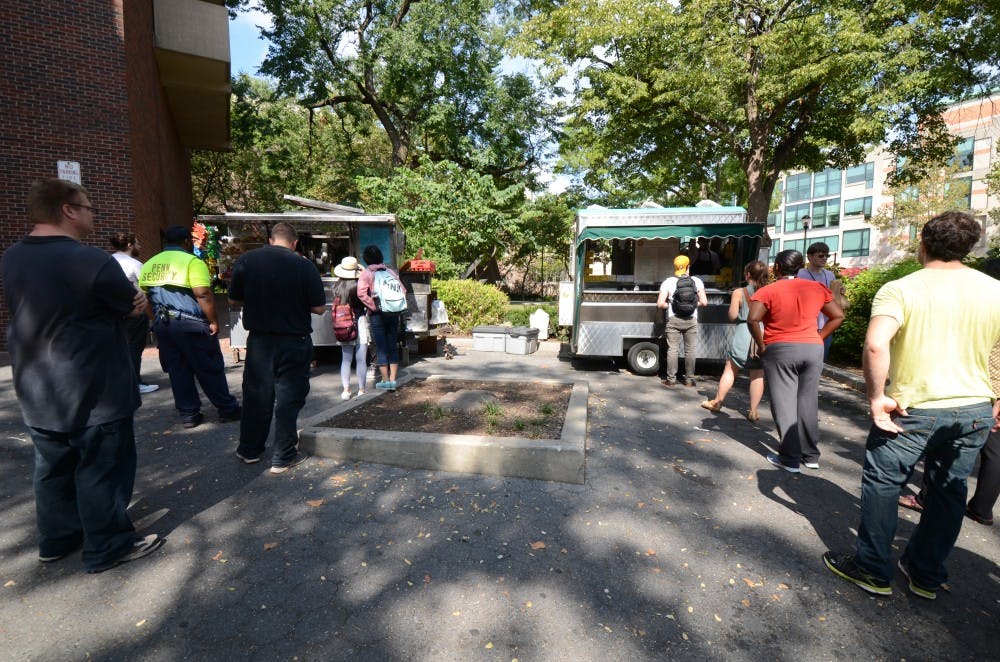
Food trucks on campus are a staple for Penn students, but the high usage of styrofoam by many trucks has become a concern. Philadelphia has yet to join the cities across the country that have put restrictions on styrofoam use in food trucks.
Credit: Katie ZhaoOver the past few years, a number of cities around the country have put restrictions on Styrofoam use in food trucks — but Philadelphia is not one of them.
With the general trend of upperclassmen ditching the meal plan after freshman year, students are faced with the challenge of finding good food options for an affordable price. The wide selection of food trucks around Penn's campus provides a solution to this, but students have expressed concern with the excess waste created by vendors serving food in styrofoam containers.
"Sometimes I think about that," College senior Sonam Khemlani. However, she understands that Styrofoam comes at a cheap price for the vendors, who then can keep prices low for consumers.
The owner of the Japanese food truck next to Pottruck Fitness Center on Walnut Street expressed this concern. The truck is a member of the Pottruck food truck "plaza," in which George's Lunch Truck and Kim's Oriental Food are located as well.
The Japanese food truck's owner, who did not provide his name, said he serves his food in Styrofoam containers because he doesn't make too much money, and if he had to switch to a different type of container, he doesn't know what he would do.
However, not all food trucks around campus face this same dilemma. For example, George's Food Truck serves strictly sandwiches, so they wrap their food and serve them in brown paper bags.
With the dining halls implementing plastic, reusable to-go containers in the dining halls, students are also thinking about how a similar system could be implemented with food trucks.
"What if there was a system where we brought our own container?" College senior Sirintra Pattaramalai questioned.
Khemlani and Pattaramalai agreed that bringing their own containers would be a good alternative to Styrofoam ones, but acknowledged it could be pain to carry a personal container around.
Penn students are not the only ones concerned by this issue. Cities such as Washington, D.C. and San Francisco have passed legislation in recent years banning food truck vendors from using Styrofoam containers.
Back in 2007, San Francisco created the Food Service Waste Reduction Ordinance which "requires food vendors and restaurants in San Francisco to use compostable or recyclable to-go containers," SF Environment's website states.
The website goes on to cite that since "polystyrene foam is non-renewable, non-biodegradable, and non-recyclable," it often ends up in landfills and can break into pieces, harming animals who may ingest it. The website also says that medical studies suggest that styrofoam can cause cancer.
More recently, Washington, D.C. have joined the food truck Styrofoam use ban. Back in July 2014, the city passed legislation restricting Styrofoam use in food trucks, with the restrictions beginning in January 2016.
Washington, D.C. Mayor Vincent C. Gray signed a bill banning Styrofoam take-out containers as part of "a larger set of environmental reforms," according to the Washington Post.
For now, it doesn't seem like Penn students will have to worry about transitioning from the Styrofoam container in food trucks, as it doesn't look like Philadelphia has any plans to make any changes anytime soon. Councilwoman Jannie Blackwell, who oversees Philadelphia's 3rd District in which University City falls in, was not available for comment.
The Daily Pennsylvanian is an independent, student-run newspaper. Please consider making a donation to support the coverage that shapes the University. Your generosity ensures a future of strong journalism at Penn.
DonatePlease note All comments are eligible for publication in The Daily Pennsylvanian.





